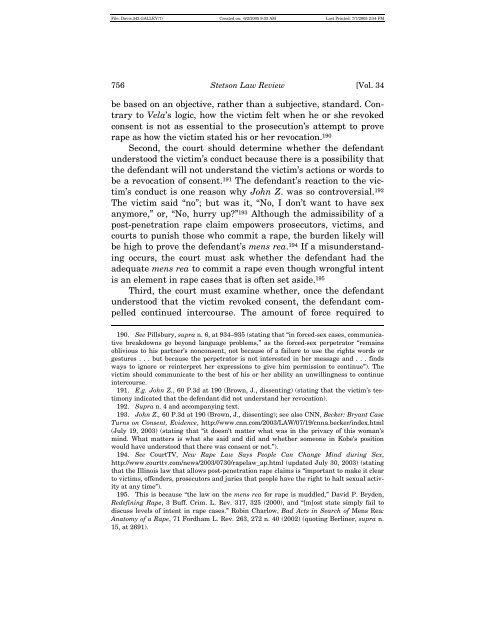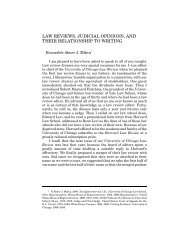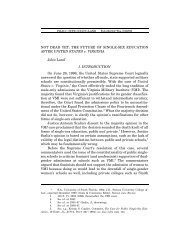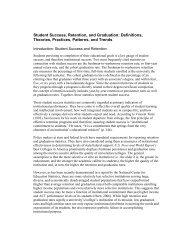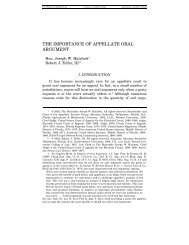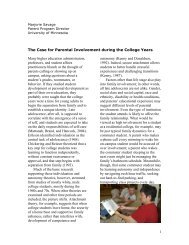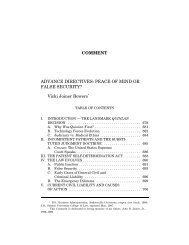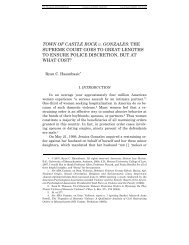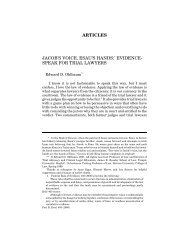the evolution of post-penetration rape law - Stetson University ...
the evolution of post-penetration rape law - Stetson University ...
the evolution of post-penetration rape law - Stetson University ...
You also want an ePaper? Increase the reach of your titles
YUMPU automatically turns print PDFs into web optimized ePapers that Google loves.
File: Davis.343.GALLEY(7) Created on: 6/2/2005 9:33 AM Last Printed: 7/7/2005 2:54 PM756 <strong>Stetson</strong> Law Review [Vol. 34be based on an objective, ra<strong>the</strong>r than a subjective, standard. Contraryto Vela’s logic, how <strong>the</strong> victim felt when he or she revokedconsent is not as essential to <strong>the</strong> prosecution’s attempt to prove<strong>rape</strong> as how <strong>the</strong> victim stated his or her revocation. 190Second, <strong>the</strong> court should determine whe<strong>the</strong>r <strong>the</strong> defendantunderstood <strong>the</strong> victim’s conduct because <strong>the</strong>re is a possibility that<strong>the</strong> defendant will not understand <strong>the</strong> victim’s actions or words tobe a revocation <strong>of</strong> consent. 191 The defendant’s reaction to <strong>the</strong> victim’sconduct is one reason why John Z. was so controversial. 192The victim said “no”; but was it, “No, I don’t want to have sexanymore,” or, “No, hurry up?” 193 Although <strong>the</strong> admissibility <strong>of</strong> a<strong>post</strong>-<strong>penetration</strong> <strong>rape</strong> claim empowers prosecutors, victims, andcourts to punish those who commit a <strong>rape</strong>, <strong>the</strong> burden likely willbe high to prove <strong>the</strong> defendant’s mens rea. 194 If a misunderstandingoccurs, <strong>the</strong> court must ask whe<strong>the</strong>r <strong>the</strong> defendant had <strong>the</strong>adequate mens rea to commit a <strong>rape</strong> even though wrongful intentis an element in <strong>rape</strong> cases that is <strong>of</strong>ten set aside. 195Third, <strong>the</strong> court must examine whe<strong>the</strong>r, once <strong>the</strong> defendantunderstood that <strong>the</strong> victim revoked consent, <strong>the</strong> defendant compelledcontinued intercourse. The amount <strong>of</strong> force required to190. See Pillsbury, supra n. 6, at 934–935 (stating that “in forced-sex cases, communicativebreakdowns go beyond language problems,” as <strong>the</strong> forced-sex perpetrator “remainsoblivious to his partner’s nonconsent, not because <strong>of</strong> a failure to use <strong>the</strong> rights words orgestures . . . but because <strong>the</strong> perpetrator is not interested in her message and . . . findsways to ignore or reinterpret her expressions to give him permission to continue”). Thevictim should communicate to <strong>the</strong> best <strong>of</strong> his or her ability an unwillingness to continueintercourse.191. E.g. John Z., 60 P.3d at 190 (Brown, J., dissenting) (stating that <strong>the</strong> victim’s testimonyindicated that <strong>the</strong> defendant did not understand her revocation).192. Supra n. 4 and accompanying text.193. John Z., 60 P.3d at 190 (Brown, J., dissenting); see also CNN, Becker: Bryant CaseTurns on Consent, Evidence, http://www.cnn.com/2003/LAW/07/19/cnna.becker/index.html(July 19, 2003) (stating that “it doesn't matter what was in <strong>the</strong> privacy <strong>of</strong> this woman'smind. What matters is what she said and did and whe<strong>the</strong>r someone in Kobe's positionwould have understood that <strong>the</strong>re was consent or not.”).194. See CourtTV, New Rape Law Says People Can Change Mind during Sex,http://www.courttv.com/news/2003/0730/<strong>rape</strong><strong>law</strong>_ap.html (updated July 30, 2003) (statingthat <strong>the</strong> Illinois <strong>law</strong> that allows <strong>post</strong>-<strong>penetration</strong> <strong>rape</strong> claims is “important to make it clearto victims, <strong>of</strong>fenders, prosecutors and juries that people have <strong>the</strong> right to halt sexual activityat any time”).195. This is because “<strong>the</strong> <strong>law</strong> on <strong>the</strong> mens rea for <strong>rape</strong> is muddled,” David P. Bryden,Redefining Rape, 3 Buff. Crim. L. Rev. 317, 325 (2000), and “[m]ost state simply fail todiscuss levels <strong>of</strong> intent in <strong>rape</strong> cases.” Robin Charlow, Bad Acts in Search <strong>of</strong> Mens Rea:Anatomy <strong>of</strong> a Rape, 71 Fordham L. Rev. 263, 272 n. 40 (2002) (quoting Berliner, supra n.15, at 2691).


